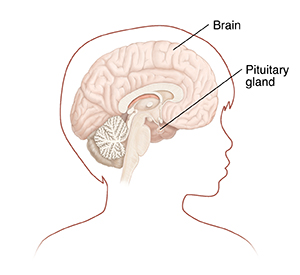Growth Hormone Deficiency
When a child's body doesn't make enough growth hormone, it's called growth hormone deficiency. It can start before birth or happen later in childhood. Growth hormone deficiency affects how much a child grows, and it can cause other symptoms. Growth hormone deficiency, by itself, does not affect a child’s brain or mental abilities.
What causes growth hormone deficiency?
Growth hormone is made by the pituitary gland. This is a tiny gland located at the base of the brain. It’s attached to a part of the brain called the hypothalamus. In some children, one or both of these areas may not form correctly before birth. Or one or both of these areas may be damaged after birth due to brain injury, tumor, or as a side effect of radiation treatments to the brain. When this happens, a child can develop growth hormone deficiency.
Growth hormone deficiency may be caused by genetic syndromes that have other symptoms. In most cases, the cause remains unknown.

What are the symptoms of growth hormone deficiency?
Symptoms can be different in each child, and can include:
How is growth hormone deficiency diagnosed?
The symptoms of growth hormone deficiency are like those of some other health conditions. Because of this, your child’s healthcare provider may need to look for other problems first. They will ask you about your child’s health history. Your child will have a physical exam and may have blood tests. The provider may advise an imaging test of the pituitary gland. They may also advise an X-ray of the hand (called a bone age test). The provider will also track your child’s growth over a period of time. They will likely refer your child to a specialist in hormone problems (pediatric endocrinologist).
How is growth hormone deficiency treated?
Growth hormone deficiency is treated with daily growth hormone shots (injections). But not all children respond to the treatment. Treatment should start when the child is as young as possible. It should continue until growth slows to less than 1 inch per year.
The length of time each child receives the shots varies. Some may get shots for the rest of their lives. They should keep being tested to make sure the shots are still needed.
Online Medical Reviewer:
Raymond Kent Turley BSN MSN RN
Online Medical Reviewer:
Rita Sather RN
Online Medical Reviewer:
Robert Hurd MD
Date Last Reviewed:
3/1/2022
© 2000-2024 The StayWell Company, LLC. All rights reserved. This information is not intended as a substitute for professional medical care. Always follow your healthcare professional's instructions.